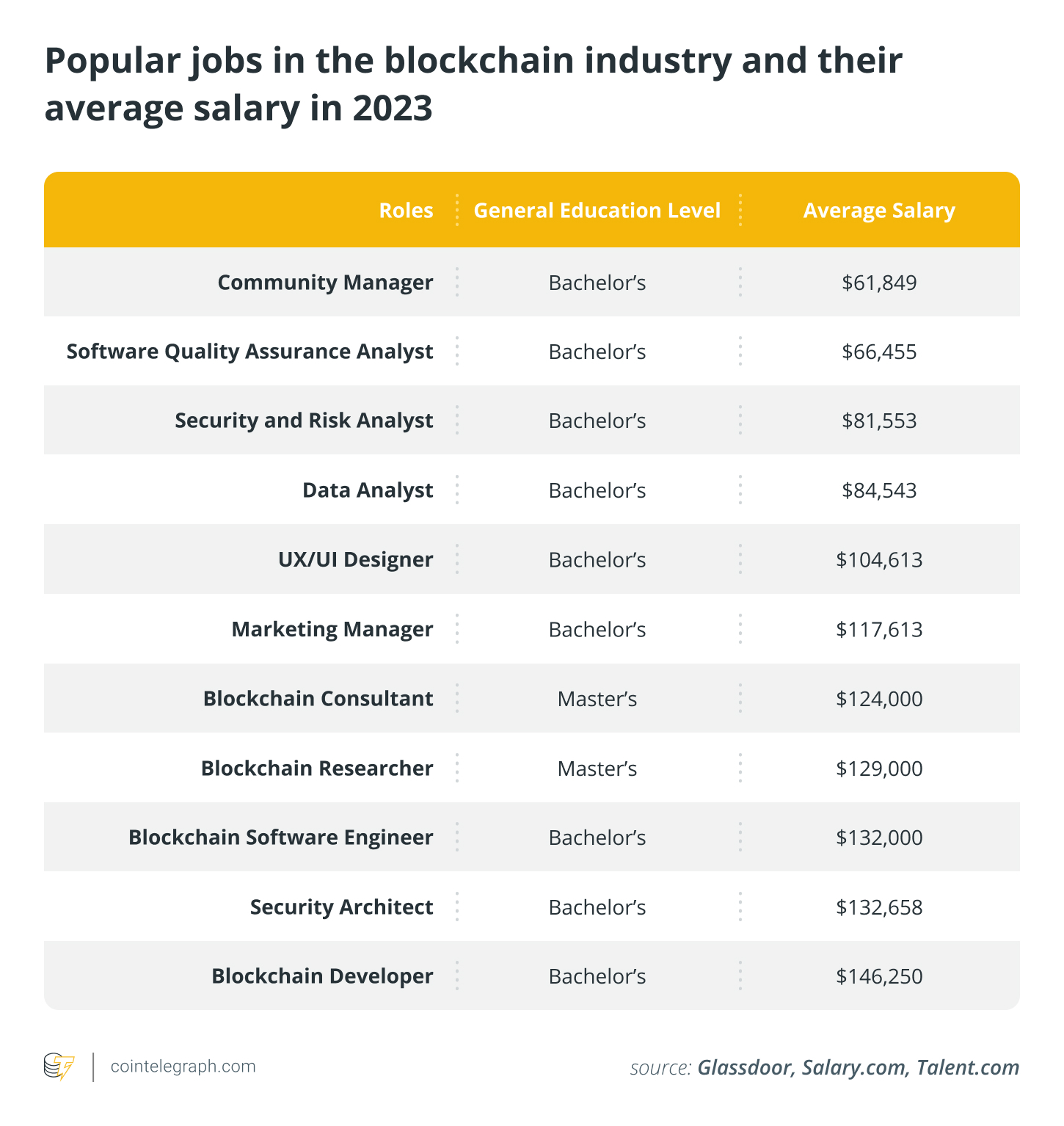[ad_1]
As speak of the Bitcoin halving, exchange-traded funds and different macro elements appear to point to the beginning of the next bull market cycle for crypto, many is perhaps contemplating beginning a profession on this house. It occurs to many individuals concerned with Bitcoin (BTC), blockchain or cryptocurrencies.
At first, they’re “buyers” researching and shopping for belongings in a brand new digital asset class. For some, this turns right into a want to enter the decentralized ledger know-how and blockchain {industry}. Many have determined to search out paths to employment and purchase the abilities essential to leap into careers on this house.
For the reason that starting of the blockchain and cryptocurrency {industry}, most individuals have discovered jobs by casual connections or demonstrable abilities.
It’s a bit tougher to interrupt by into this rising {industry} at the moment, however universities have stepped up with an answer. Formal blockchain levels at the moment are supplied throughout the globe, permitting people to grasp the ideas on which the sector is constructed whereas networking and gaining inroads into the {industry}.
For the reason that bear market and the following slowdown of the blockchain {industry} in late 2021, there have been significant human resource cuts at crypto-centric companies like Coinbase, Gemini and Consensys.
The final half of 2023 has just lately seen growing speculation and potential signals that the beginning of the subsequent bull market is approaching. Growing exercise within the blockchain {industry} suggests the elevated want for expertise to satisfy the upcoming demand, and many individuals are concerned about getting a foot within the door at a crypto firm and discovering methods to set themselves other than the remainder of the {industry}.
Not everyone seems to be a high-profile individual like Jon Dalby, who left his function as chief monetary officer of Bridgewater Associates to affix New York Digital Funding Group (NYDIG) in 2021. Dalby introduced with him conventional finance expertise that’s priceless to NYDIG.
Nonetheless, not all levels can simply translate into the blockchain {industry}, as people should grasp the technical and practical sides to know the distinctive worth propositions this new {industry} holds.
The blockchain {industry} has been reported to be on the street to severe progress, with a predicted steady common progress charge of 59.9% from 2023 to 2030. In response to PwC, there will be over 40 million blockchain industry-related jobs worldwide by 2030. Wanting on the common salaries for some frequent blockchain {industry} jobs in america, the extra expansive the job obligations, the larger the necessity for a complicated diploma.

Conventional instructional establishments like schools and universities worldwide now provide diploma applications specializing in blockchain know-how. Some are purely technical, whereas others mix enterprise and tech.
These applications’ existence begs the query: Are these formal levels valued in a still-maturing {industry}? Do they offer a level holder a bonus within the present market? Is that this an indication that the {industry} is maturing, and we must always look to those tutorial credentials as an indication of a sure degree of competence?
What do blockchain educators say?
Cointelegraph reached out to varied college program administrators throughout the globe to get their tackle the objectives of formal blockchain education schemes.
Brian Houillion, program coordinator of the University of the Cumberlands’ grasp’s program in world enterprise with blockchain know-how, advised Cointelegraph that this system is “making ready our enterprise college students to serve in roles that associate and help the roles of entrepreneurs and builders.”
Magazine: Terrorism & Israel-Gaza war weaponized to destroy crypto
He stated that one of the vital abilities wanted within the blockchain {industry} is a deeper understanding of regulatory points, particularly in order that innovation is “not smothered earlier than it will probably develop” by permitting these upcoming blockchain professionals to work with lawmakers because the {industry} matures.
The pinnacle of the European Blockchain Center, Roman Beck, advised Cointelegraph, “Formal levels enable for signaling and positioning the subject subsequent to extra established levels and thus enhance the visibility of the blockchain {industry},” offering larger legitimacy among the many conventional world.
He believes the {industry} wants extra people with the talent units to “develop financial fashions that enable for decentralized companies that create and seize worth, which is essentially the most pressing talent and mindset for blockchain architects and builders.”
Michael Jones, the director of the College of Cincinnati’s Cryptoeconomics Lab, advised Cointelegraph that having formal levels brings legitimacy and credibility to the {industry} general. Past signaling to the standard world that decentralized ledger and blockchain applied sciences deserve additional examine, he talked about “the networking alternatives with college students from a number of disciplines like laptop science, math or economics.”
The primary talent Jones believes the {industry} wants is “threat evaluation and threat administration.” Merely figuring out the technological abilities however not having a “basic understanding of market threat, operational threat, counterparty threat, protocol threat, regulatory threat, and so on.” will end result within the {industry} adoption of blockchain know-how being “sluggish and uneven.”
Every of those applications has produced {industry} professionals who’ve gone on to work on the likes of Chainalysis, MakerDAO, Brainbot, TradeLens, ZTLment, Januar, Concordium and Actuality+, amongst others.
For instance, the European Blockchain Heart and the College of the Cumberlands boast alumni Demelza Hays and Michael Tabone, respectively, who work for Cointelegraph as economists and researchers.
All this system administrators interviewed have combined opinions on the present state of the blockchain {industry} and the way it values formal schooling.
Jones said that whereas the {industry} doesn’t significantly worth formal levels, “universities haven’t essentially been good {industry} companions. Universities may be sluggish to introduce new and revolutionary curricula, and lots of universities are unwilling to pay prime greenback to draw {industry} consultants to show college students.”
Houillion added that it seems the “{industry} is in search of anybody that may deal with positions” however that “a proper diploma inside the house could be fascinating, particularly when associated to a non-developer/programmer function.”
Beck sees the {industry} as valuing formal levels, however “what they actually worth is an schooling the place college students have developed a mindset to assume decentralized, capable of think about and notice distributed worth co-creation networks.”
What do blockchain recruiters say?
The upper schooling establishments named above are forward-thinking in making ready college students for work within the blockchain and decentralized ledger know-how industries. The hiring course of in Web3, nonetheless, is just not as conventional and doesn’t essentially hinge on formal credentials.
Cointelegraph needed to get the opposite facet of the proverbial coin and requested some Web3/blockchain recruiters their tackle formal levels and what they might imply for the {industry} sooner or later.
All of the recruiters interviewed stated they’ve had purchasers get employed with formal levels. The simplest levels to transition to the blockchain {industry} and which are in essentially the most demand are technical in nature, resembling coding and cryptography.
This is sensible, because the extra extremely specialised abilities must be stuffed first, particularly in a nascent, rising {industry}. Nonetheless, all consider that demand for people with further {qualifications} however who’ve a agency background within the technical features will enhance because the {industry} grows.
“I believe that diploma paths get folks concerned earlier, and it’ll legitimize the house much more,” Ryan Hawley, head of recruiting at Crypto Recruiters, advised Cointelegraph. He added, “In time, [formal blockchain degrees] might be universally accepted.” He listed cryptography, good contracts, database administration and compliance as the highest 4 in-demand abilities employers search.
David Lamb of CB Recruitment advised Cointelegraph that formal blockchain levels could also be undervalued presently, as references are far more casual in Web3.
Nonetheless, having formal diploma paths would convey credibility not solely to the {industry} typically however to a brand new pool of people who might not have entered the house if not for these applications.
From Lamb’s perspective, a proper diploma in blockchain indicators, on the very least, a ardour for the sector, in addition to a minimal publicity to the varied components essential to make a blockchain skilled:
“Demand is coming again into the market, and there aren’t sufficient good builders to go round. Nonetheless, I’d argue that non-technical specialists are equally vital to the {industry} because it grows right into a multitrillion-dollar {industry}.”
He went on to checklist advertising, operations, finance, authorized, gross sales and analysis analysts as equally vital jobs that Web3 companies will want because the {industry} matures.
Recent: How the crypto bull run can impact Web3 gaming beyond play-to-earn
Connor Holliman of Proof of Expertise echoed a few of these sentiments to Cointelegraph: “[Formal blockchain degrees] create a chance for scalability inside the house. Present processes in onboarding folks to make use of blockchain know-how are like studying a overseas language. As somebody who had no background in blockchain prior, I’ve needed to undergo trials and tribulations to actually discover ways to transact on and use numerous blockchains. The extra people who come into this house with formal backgrounds, the better it will likely be to onboard the subsequent billion customers.”
Holliman stated that as blockchain use circumstances develop, comfortable abilities like communication between totally different elements of a Web3 enterprise might be extremely valued. Engineers, cryptographers and developer relations are three in-demand paths in Web3 at the moment.
Whereas no magic bullet will assure a level holder a Web3 job, it might give candidates a possible leg up on the competitors sooner or later. It’s also a type of incubator to work with different like-minded people who will all be making an attempt to move into the sector on the similar time. This networking could also be well worth the worth of admission alone, giving college students the prospect to create the subsequent revolutionary Web3 mission on this setting.
[ad_2]
Source link





